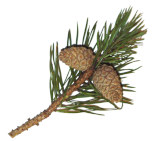A response: May 2019
Before he was King of Scotland, David I was Earl of Huntingdon. No-one in their right mind would use this fact as a basis for claiming that David was a Norman adventurer who decided to seek his fortune in Scotland. Yet this is an exact parallel of the argument proposed by James 'Hank' Grant which was given space in and hence promulgated through Standfast MK53. A year ago I found the need to correct the many errors and contrivances put forward by the same author with Geoff Grant in their effort to promote the Grant fake history invented in 1773 by 'The Good' Sir James to distance himself fromhis Stewart origins. Sadly lessons have not been learned and so here I am again.
Bisset: All the Scottish Bissets came from Upsettlington. The land had been given to Robert Bisset by King David I in compensation for his army's pillaging of Hexham where Robert had been Prior. The John Bisset installed in the Aird was from Upsettlington and had proved himself at the Scottish court prior to his promotion cemented by his being given Agnes, William the Lyon's daughter, for his wife. Hank's phraseology is sleakit. While it is true that Walter Bisset held Stratherrick and Aboyne prior to forfeiture it is unhelpful to suggest that "Lord Aboyne held Stratherrick" and there was no "eventuality" about Stratherrick passing to Gregor Grant - it followed directly on the forfeiture. Subsequent Bissets of Aboyne (and, mainly, Lesssendrum) were a cadet branch of the Lovat family who were not involved in the forfeiture and so did not have to flee.
Moffat/Mowat: It is NOT true that the de Monte Alto family came North with David I. Had this been the case there would have been no reason for David I install the first Robert Bruce as Lord of Annandale. In fact William fitz Ralph (who took his surname 'de Monte Alto' from Great Hill at the head of Annandale) came to Scotland in 1094 as part of Duncan II's Norman-backed army. It was his subsequent close relationship with the Donalbane régime (he married Gunhilda, youngest daughter of Olaf Hemingsson) which made David view him as unreliable. Members of the family later returned to England and Wales (with Robert Bruce senior) because, like Bruce, they opposed David I in the English civil war between Stephen and Matilda. Like the Johnstons, the Mowats are cadets of the Moffats. They left Annandale because they wanted more than could be available to them there.
Comyn: According to Hank the Comyns seem to appear out of nowhere. But their place in Scotland is because, in Northumberland, they married into the family of Donalbane, king of Scotland 1094-7 and his queen Hextilda, daughter of Olaf Hemingson (Progenitor of the Siol Alpin Clans including principally the Grants). Thus the Grants and Comyns were closely related.
Stewart: Hank says that the ancestors of the Royal Stewards of Scotland came from Brittany. Technically this is true, but they are weasel words. A quick glance at the names in the family shows that in Brittany they were refugees from Britain - as so many were. Thus when they crossed the channel they were actually 'coming home'. They were British - NOT Norman, NOT Flemish and NOT Saxon.
Grant: And then we come to the whole reason for Hank to write this piece - to insinuate yet again the 1773 lie that the Grants were Anglo-Norman. Hank tries to imply that Laurence was the first. If so why do the chiefs count from "one before Gregory"? When Hank says "later" he even implies that Laurence himself was not a chief. He has no understanding of the estate of Stratherrick which came to the Grants through the marriage of Gregory Grant to Mary Bisset, granddaughter of William the Lyon. What I cannot fathom is the basis of his visceral and emotional attachment to the 1773 lie - and he is silent on the matter.
Apart from these Sins of Commission there are those of Omission: why no mention of Campbell and Cameron?
There was NO "Anglo-Norman Collective". The Scottish kings who had spent a lot of time in England certainly wanted to introduce the feudal system into Scotland and they did invite Flemings and Normans to assist in implementing this - but this was the choice of the kings, NOT some organic change generated and engineered by the foreigners and only then foisted on the Scottish Crown, as Hank seeks to imply. Far from being a collective, the Flemish and Norman barons spent a great deal of time fighting each other (the Flemings' claim of descent from Charlemagne provided a pretext for snobbery exercised at the Normans' expense).
It is outrageously presumptious of Hank to claim that Anglo-Norman etc. families were "instrumental in establishing the foundation of the Scottish Nation". How dare he? The Picts and Scots were united in the 850s, Lothian annexed in 1018. Strathclyde was subsumed after 950 (although not fully integrated until c1100). Conversely the Northern and Western Isles were not finally Scottish until 1468. None of this had anything to do with Anglo-Normans. On the contrary because many of these magnates held land in England they often swapped sides, so they actually threatened the Scottish state nearly as much as they supported it.
Clearly Hank has deliberately chosen NOT to acquaint himself with the work of Peter Grant of East Lavant who has comprehensively disproved Sir William Grant's absurd Pied-Piper-style propositions regarding Grant origins. Peter has documented the Bissets providing an understanding never previously available. And he chooses to ignore my "Scottish Clans: Legend, Logic & Evidence". The only conceivable reason he does this is that he cannot rebut the thesis proposed therein.
